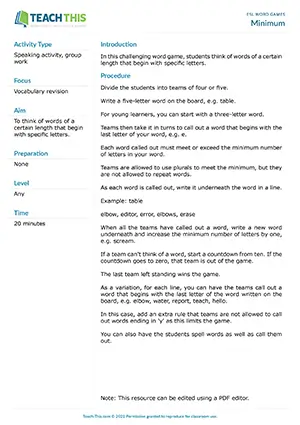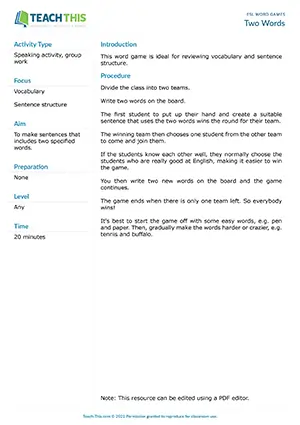ESL Word Games
A Ship Comes Loaded

ESL Word Game - Vocabulary and Speaking: Memorisation, Forming Words from Prompts
In this ESL word game, students remember and say words beginning with a certain letter. Have the students sit in a circle. Ask the students to choose a letter of the alphabet, e.g. B. Explain that the aim of the game is to say a word beginning with...
Match the Squares

ESL Word Game - Vocabulary: Memorisation, Matching - Group Work
This fun matching words game can be used when you want to review words that match in some way, e.g. adjective opposites, verb opposites, prepositions, past and present verbs, etc. Draw a six-by-four grid on the board and number the...
Minimum

ESL Word Game - Vocabulary: Forming Words from Prompts - Group Work
In this challenging word game, students form words of a certain length that begin with specific letters. Write a five-letter word on the board, e.g. table. For young learners, start with a three-letter word. Teams then take it in turns to call out a word that...
The Longest Word

ESL Word Game - Vocabulary and Spelling: Answering Questions, Guessing, Forming Words - Group Work
In this word game, students make the longest word they can from letters won by guessing the answers to clues. One team selects a letter of the alphabet, e.g. s. Choose a word beginning with that letter...
Tic Tac Words

ESL Word Game - Vocabulary: Forming Words from Prompts - Group Work
Here is an engaging ESL word game based on Tic-Tac-Toe. Draw a three-by-three grid on the board. Write a random letter in each square. Under each letter, write a number between one and ten. Teams then take it in turns to choose a letter...
Two Words

ESL Word Game - Vocabulary and Speaking: Forming Sentences from Prompts - Group Work
This word game is ideal for reviewing vocabulary and sentence structure. Write two words on the board. The first student to put up their hand and create a suitable sentence that uses the two words...
Word Square

ESL Word Game - Vocabulary and Spelling: Forming Words from Prompts - Group Work
Here is a fun ESL word game to play with your students. Draw a three-by-three grid on the board. In the squares, write a nine-letter word in a random order. The centre square must contain a vowel. The aim of the game is for the teams to make as many...
Lewis Carroll's Game

ESL Word Game - Vocabulary and Spelling: Forming Words from Prompts - Group Work
This intriguing word game was invented by Lewis Carroll who wrote "Alice in Wonderland". Tell the students that they are going to play a game where they change one word into another by changing one letter at a time. Explain that letters...
Word Race

ESL Word Game - Vocabulary and Writing: Forming Words from Prompts - Group Work
This ESL word game can be used to practice or review a variety of vocabulary. Tell the students that they have one minute to write down as many words as possible that match certain criteria, e.g. words beginning with certain prefixes, certain...
Balderdash

ESL Defining Words Game - Vocabulary and Writing: Writing Definitions, True or False, Guessing - Group Work
This ESL word game is based on a popular board game of the same name. In the game, students invent false definitions for words and score points by correctly guessing true definitions. Give each...
Here's what our members are saying...
